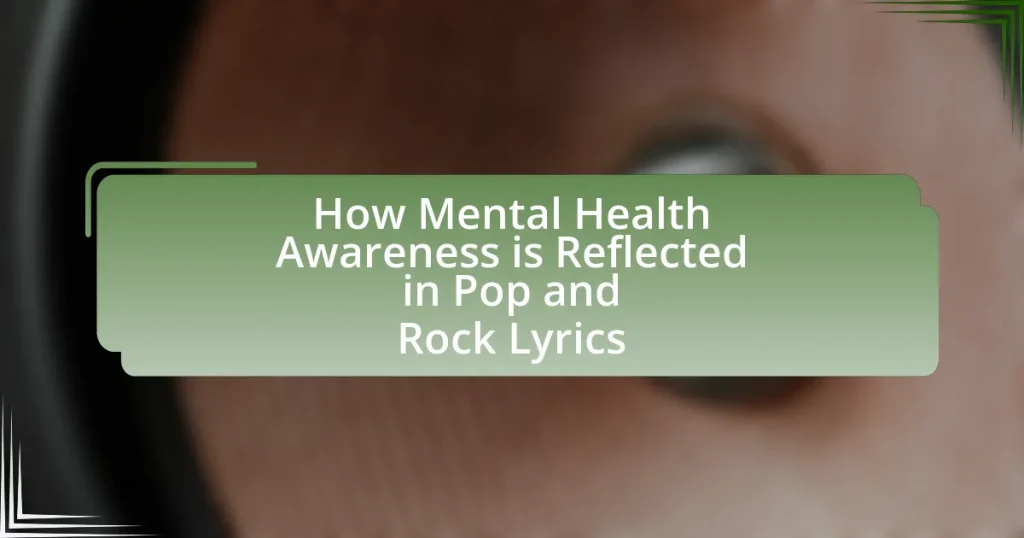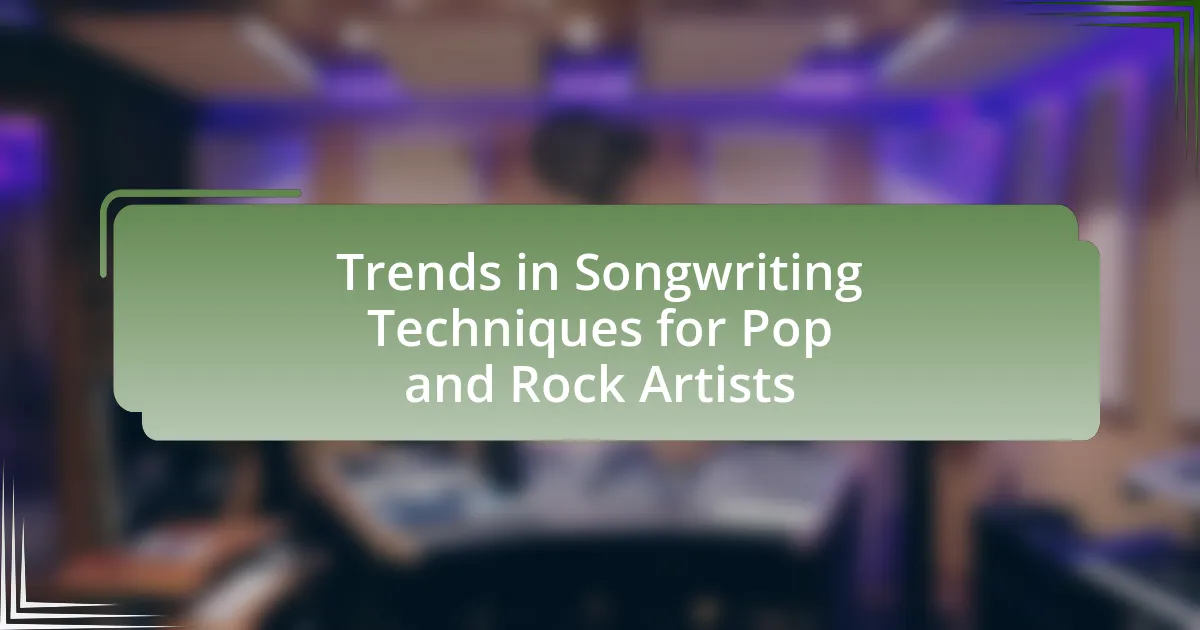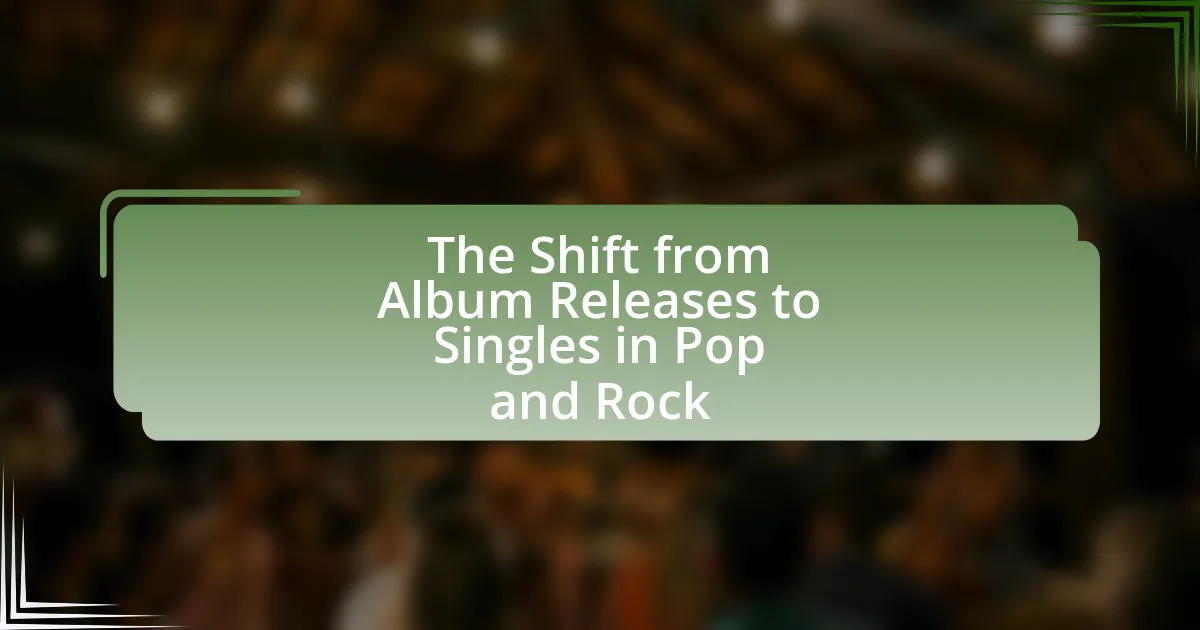The article examines how mental health awareness is reflected in pop and rock lyrics, highlighting the candid exploration of emotional struggles and personal experiences by artists such as Linkin Park and Billie Eilish. It discusses common themes related to mental health, including anxiety, depression, and self-identity, and emphasizes the role of vulnerability in fostering connections with listeners. The piece also addresses the evolution of lyrical content over time, the impact of music on public perception of mental health, and the importance of community engagement in promoting awareness. Additionally, it provides specific examples of songs that effectively address mental health issues and outlines initiatives that combine music with mental health advocacy.
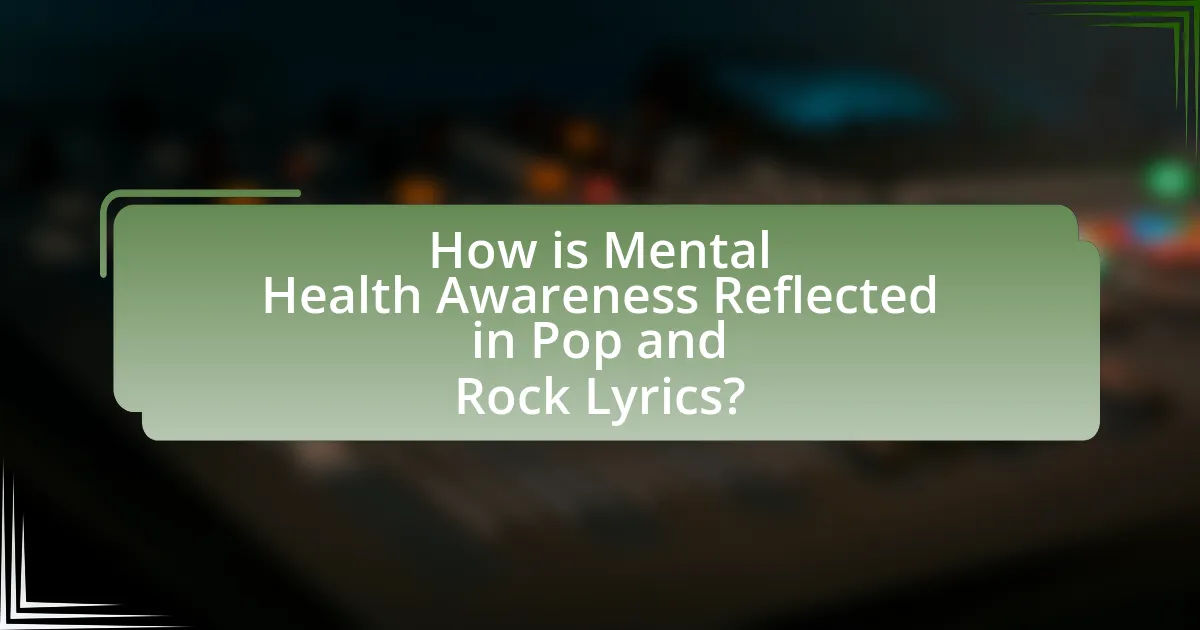
How is Mental Health Awareness Reflected in Pop and Rock Lyrics?
Mental health awareness is reflected in pop and rock lyrics through the candid exploration of emotional struggles, personal experiences, and societal issues related to mental health. Artists like Linkin Park in “Numb” and Billie Eilish in “Bellyache” openly discuss feelings of anxiety, depression, and guilt, creating a dialogue that resonates with listeners. This lyrical honesty not only normalizes mental health conversations but also encourages fans to seek help and share their own experiences. Research indicates that music can serve as a therapeutic tool, with studies showing that listening to songs addressing mental health can reduce feelings of isolation and promote emotional healing.
What themes related to mental health are commonly found in pop and rock lyrics?
Common themes related to mental health found in pop and rock lyrics include depression, anxiety, self-identity, and emotional struggles. These themes are often expressed through personal narratives and relatable experiences, allowing listeners to connect with the artists’ feelings. For instance, songs like “Numb” by Linkin Park address feelings of inadequacy and emotional numbness, while “Breathe Me” by Sia explores themes of vulnerability and the need for support. Research indicates that music can serve as a therapeutic tool, with studies showing that lyrical content addressing mental health can foster understanding and reduce stigma surrounding these issues.
How do artists express feelings of anxiety and depression in their songs?
Artists express feelings of anxiety and depression in their songs through raw, emotive lyrics that often depict personal struggles and mental health challenges. For instance, many songwriters utilize metaphors and vivid imagery to convey their emotional states, allowing listeners to connect with their experiences. A notable example is the song “Numb” by Linkin Park, which articulates feelings of inadequacy and isolation, resonating with those facing similar issues. Additionally, artists like Billie Eilish in “Bellyache” explore themes of guilt and internal conflict, further highlighting the complexities of mental health. These expressions not only raise awareness but also foster a sense of community among listeners who may feel alone in their struggles.
What role does vulnerability play in the lyrics of pop and rock music?
Vulnerability plays a crucial role in the lyrics of pop and rock music by allowing artists to express their emotional struggles and connect with listeners on a deeper level. This expression of vulnerability often addresses themes such as heartbreak, anxiety, and self-doubt, which resonate with audiences who may share similar experiences. For instance, songs like “Hurt” by Nine Inch Nails and its cover by Johnny Cash highlight feelings of despair and regret, showcasing how vulnerability can evoke empathy and understanding. Research indicates that music with vulnerable themes can foster emotional release and validation for listeners, reinforcing the importance of mental health awareness in these genres.
Why is mental health awareness important in the music industry?
Mental health awareness is crucial in the music industry because it addresses the high prevalence of mental health issues among artists and industry professionals. Studies indicate that musicians are more likely to experience mental health challenges, with a survey by Help Musicians UK revealing that 71% of musicians have experienced anxiety or depression. This awareness fosters a supportive environment, encourages open discussions, and promotes access to mental health resources, ultimately leading to healthier creative processes and improved overall well-being in the industry.
How can music influence public perception of mental health issues?
Music can significantly influence public perception of mental health issues by shaping narratives and fostering empathy. Through lyrics that address mental health struggles, artists can normalize conversations around these topics, reducing stigma. For instance, songs like “1-800-273-8255” by Logic directly reference suicide prevention, leading to increased awareness and discussions about mental health. Research published in the Journal of Music Therapy indicates that music can enhance emotional understanding and connection, which can lead to greater acceptance of mental health challenges in society. This demonstrates that music not only reflects but also actively shapes public attitudes towards mental health.
What impact do artists have on their listeners’ understanding of mental health?
Artists significantly enhance their listeners’ understanding of mental health by addressing complex emotional issues through their lyrics and public personas. By openly discussing topics such as depression, anxiety, and personal struggles, artists like Logic in “1-800-273-8255” and Billie Eilish in “Bellyache” provide relatable narratives that resonate with audiences. This representation fosters empathy and reduces stigma, as evidenced by studies indicating that music can serve as a therapeutic tool, promoting dialogue about mental health (e.g., a 2019 study published in the Journal of Music Therapy). Consequently, artists play a crucial role in shaping societal perceptions and encouraging conversations around mental health.
How have pop and rock lyrics evolved in their portrayal of mental health?
Pop and rock lyrics have evolved significantly in their portrayal of mental health, transitioning from stigmatization and silence to open discussion and advocacy. In earlier decades, such as the 1960s and 1970s, artists often hinted at mental health struggles through metaphors or vague references, reflecting societal taboos surrounding mental illness. For instance, songs like “Brain Damage” by Pink Floyd addressed mental health indirectly, using abstract language to convey the experience of mental illness.
In contrast, contemporary pop and rock lyrics increasingly feature explicit discussions of mental health issues, reflecting a growing societal awareness and acceptance. Artists like Billie Eilish and Logic openly address topics such as depression and anxiety in songs like “Bellyache” and “1-800-273-8255,” respectively. These songs not only normalize conversations about mental health but also provide listeners with resources and support, illustrating a shift towards advocacy and destigmatization.
This evolution is supported by research indicating that music can play a crucial role in shaping public perceptions of mental health. A study published in the Journal of Music Therapy found that music can facilitate emotional expression and promote mental well-being, further emphasizing the importance of these lyrical changes in fostering understanding and support for mental health issues.
What historical changes can be observed in the representation of mental health in music?
The representation of mental health in music has evolved significantly from the early 20th century to the present day. Initially, mental health issues were often stigmatized and rarely discussed in popular music, with artists typically avoiding the topic altogether. However, by the 1960s and 1970s, musicians began to openly address mental health struggles, as seen in songs like “Help!” by The Beatles and “Brain Damage” by Pink Floyd, reflecting a growing awareness and acceptance of mental health issues in society.
In the 1990s and 2000s, the representation became more explicit, with artists such as Nirvana and Linkin Park addressing themes of depression and anxiety in their lyrics, resonating with a generation grappling with these issues. This trend continued into the 2010s and 2020s, where artists like Billie Eilish and Logic have used their platforms to discuss mental health openly, promoting awareness and encouraging conversations around the topic.
The shift from stigma to acceptance in music mirrors broader societal changes regarding mental health, highlighting the importance of representation in reducing stigma and fostering understanding.
How do contemporary artists address mental health compared to past generations?
Contemporary artists address mental health more openly and directly than past generations, often incorporating personal narratives and societal issues into their work. For instance, artists like Billie Eilish and Logic have created songs that explicitly discuss mental health struggles, such as anxiety and depression, reflecting a cultural shift towards vulnerability and honesty. In contrast, past generations often masked these themes in metaphor or avoided them altogether, as seen in the works of artists from the 1960s and 1970s, who typically focused on broader social issues rather than personal mental health experiences. This evolution is supported by studies indicating that mental health discussions in music have increased significantly in the 21st century, highlighting a growing acceptance and awareness of mental health issues in society.

What are the specific examples of songs that highlight mental health themes?
Specific examples of songs that highlight mental health themes include “1-800-273-8255” by Logic, which addresses suicide prevention and mental health struggles, and “Numb” by Linkin Park, which explores feelings of inadequacy and emotional pain. Additionally, “Breathe Me” by Sia delves into themes of vulnerability and seeking help, while “Fight Song” by Rachel Platten promotes resilience and empowerment in the face of mental health challenges. These songs resonate with listeners by articulating personal experiences related to mental health, thereby raising awareness and fostering discussions around these important issues.
Which pop songs effectively address mental health issues?
Pop songs that effectively address mental health issues include “1-800-273-8255” by Logic, “Breathin” by Ariana Grande, and “Fight Song” by Rachel Platten. “1-800-273-8255” directly discusses suicide prevention and mental health awareness, named after the National Suicide Prevention Lifeline, and it emphasizes the importance of seeking help. “Breathin” explores anxiety and the struggles of coping with overwhelming feelings, resonating with listeners who experience similar challenges. “Fight Song” serves as an anthem of empowerment, encouraging resilience in the face of mental health struggles. These songs contribute to the conversation around mental health, providing relatable narratives and promoting awareness.
What lyrics from these songs resonate most with listeners struggling with mental health?
Lyrics that resonate most with listeners struggling with mental health often express feelings of isolation, despair, and the search for hope. For example, in “Numb” by Linkin Park, the line “I can’t feel you there, become so numb” captures the sense of emotional detachment many experience. Similarly, in “Breathe Me” by Sia, the lyrics “Help, I have done it again” convey a plea for support amidst recurring struggles. These songs reflect common themes of vulnerability and the desire for connection, which are crucial for listeners facing mental health challenges.
How do these songs contribute to the conversation around mental health awareness?
Songs contribute to the conversation around mental health awareness by openly addressing issues such as depression, anxiety, and emotional struggles, thereby reducing stigma and encouraging dialogue. For instance, tracks like “1-800-273-8255” by Logic directly reference suicide prevention and provide listeners with resources, while artists like Billie Eilish discuss personal experiences with mental health challenges in songs like “Bellyache.” These representations not only validate the feelings of those struggling but also promote understanding and empathy among listeners, as evidenced by studies showing that music can foster emotional connection and awareness regarding mental health topics.
What rock songs have made significant statements about mental health?
Rock songs that have made significant statements about mental health include “Numb” by Linkin Park, which addresses feelings of inadequacy and emotional numbness, and “Brain Damage” by Pink Floyd, which explores themes of mental illness and societal perceptions. “Hurt,” originally by Nine Inch Nails and famously covered by Johnny Cash, delves into deep emotional pain and regret. Additionally, “Creep” by Radiohead captures feelings of alienation and self-doubt. These songs resonate with listeners by articulating struggles with mental health, thereby raising awareness and fostering discussions around the topic.
How do the musical styles of these rock songs enhance their mental health messages?
The musical styles of rock songs enhance their mental health messages through powerful instrumentation and emotive vocal delivery. For instance, the use of heavy guitar riffs and dynamic drumming creates an intense atmosphere that mirrors the struggles of mental health, making the listener feel the weight of the lyrics. Songs like “Creep” by Radiohead utilize a haunting melody and raw vocal expression to convey feelings of alienation and despair, effectively resonating with listeners who may experience similar emotions. Additionally, the incorporation of anthemic choruses in tracks such as “Fight Song” by Rachel Platten empowers individuals, promoting resilience and hope. This combination of musical elements not only amplifies the lyrical content but also fosters a deeper emotional connection, reinforcing the importance of mental health awareness in rock music.
What personal stories do artists share in their lyrics related to mental health?
Artists share personal stories in their lyrics related to mental health by expressing struggles with anxiety, depression, and trauma. For example, artists like Logic in “1-800-273-8255” narrate experiences of suicidal thoughts and the journey toward seeking help, directly referencing the National Suicide Prevention Lifeline. Similarly, Billie Eilish’s song “Bellyache” explores guilt and the emotional turmoil following a wrongdoing, reflecting the internal conflict many face. These narratives not only highlight individual battles but also foster a sense of community and understanding among listeners, emphasizing the importance of mental health awareness in contemporary music.
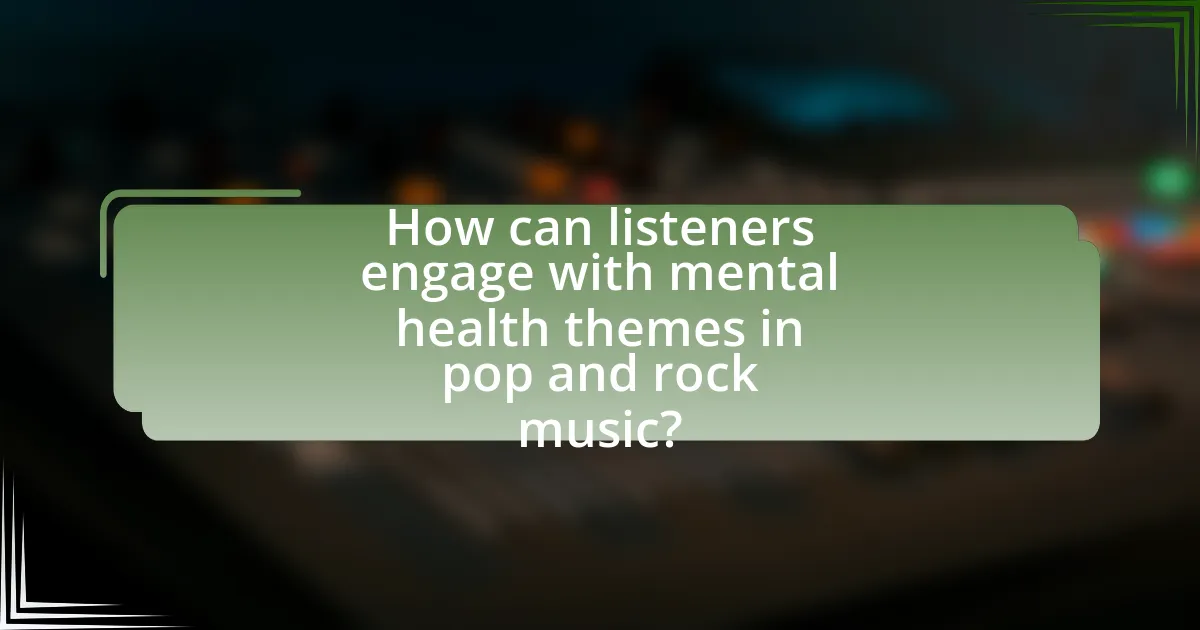
How can listeners engage with mental health themes in pop and rock music?
Listeners can engage with mental health themes in pop and rock music by actively analyzing lyrics and connecting personal experiences to the messages conveyed. This engagement allows listeners to reflect on their own mental health journeys, fostering a sense of community and understanding. For instance, songs like “1-800-273-8255” by Logic directly address suicide prevention, encouraging listeners to seek help and share their struggles. Research indicates that music can serve as a therapeutic tool, with studies showing that lyrical content can influence emotional processing and coping mechanisms. By participating in discussions about these themes on social media or in fan communities, listeners can further deepen their understanding and support for mental health awareness.
What are some ways listeners can find support through music?
Listeners can find support through music by engaging with lyrics that resonate with their emotional experiences, providing a sense of validation and understanding. For instance, songs that address themes of anxiety, depression, or personal struggles can help listeners feel less isolated, as they recognize their feelings reflected in the music. Research indicates that music can trigger emotional responses and foster connections, with studies showing that 61% of people report using music as a coping mechanism during difficult times. Additionally, participating in music communities, whether online or in-person, allows listeners to share their experiences and find solidarity with others facing similar challenges.
How can creating playlists centered on mental health themes be beneficial?
Creating playlists centered on mental health themes can be beneficial by providing emotional support and fostering a sense of connection for individuals experiencing mental health challenges. Research indicates that music can influence mood and reduce feelings of anxiety and depression; for instance, a study published in the Journal of Music Therapy found that music interventions significantly improved mental health outcomes in participants. By curating playlists that resonate with specific mental health themes, individuals can find solace, validation, and encouragement through lyrics and melodies that reflect their experiences, ultimately promoting healing and resilience.
What role does community play in discussing mental health through music?
Community plays a crucial role in discussing mental health through music by providing a supportive environment that encourages open dialogue and shared experiences. This collective engagement fosters a sense of belonging and reduces stigma associated with mental health issues, as seen in various music movements where artists and fans unite to address these topics. For instance, initiatives like the “Mental Health Awareness Month” in the music industry have led to increased visibility and discussions around mental health, demonstrating that community involvement can amplify the message and impact of mental health awareness in pop and rock lyrics.
How can fans use music as a tool for mental health awareness?
Fans can use music as a tool for mental health awareness by actively engaging with lyrics that address mental health issues and sharing these insights within their communities. By discussing songs that highlight struggles with anxiety, depression, or other mental health challenges, fans can foster conversations that reduce stigma and promote understanding. For example, studies show that songs like “1-800-273-8255” by Logic have sparked discussions about suicide prevention, leading to increased calls to crisis hotlines. This demonstrates how music can serve as a catalyst for awareness and support, encouraging listeners to seek help and connect with others facing similar challenges.
What initiatives exist that combine music and mental health advocacy?
Initiatives that combine music and mental health advocacy include organizations like Musicians’ Mental Health Coalition, which aims to raise awareness and provide resources for mental health support within the music industry. Another initiative is the “Music for Mental Health” project, which utilizes music therapy to help individuals cope with mental health issues. Additionally, events like “Mental Health Music Festival” promote mental health awareness through performances and discussions. These initiatives are supported by research indicating that music can significantly improve mental well-being, as highlighted in studies published in journals such as the Journal of Music Therapy.
How can listeners participate in conversations about mental health inspired by lyrics?
Listeners can participate in conversations about mental health inspired by lyrics by engaging in discussions on social media platforms, attending events, and sharing personal experiences related to the themes presented in the songs. Social media platforms like Twitter and Instagram allow listeners to comment on lyrics, share their interpretations, and connect with others who resonate with similar feelings, fostering a community dialogue. Events such as concerts or mental health awareness workshops often include discussions about the impact of music on mental health, providing a space for listeners to express their thoughts and learn from others. Additionally, sharing personal stories related to the lyrics can help destigmatize mental health issues and encourage open conversations, as evidenced by initiatives like the #MentalHealthAwareness hashtag, which has garnered millions of interactions, highlighting the collective effort to address mental health through music.
